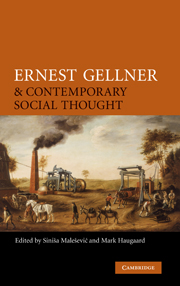Book contents
- Frontmatter
- Contents
- Notes on contributors
- Acknowledgements
- Introduction: an intellectual rebel with a cause
- Part I Civil society, coercion and liberty
- 1 Ernest Gellner on liberty and modernity
- 2 Predation and production in European imperialism
- 3 Power, modernity and liberal democracy
- 4 Gellner versus Marxism: a major concern or a fleeting affair?
- Part II Ideology, nationalism and modernity
- Part III Islam, postmodernism and Gellner's metaphysic
- Index
- References
4 - Gellner versus Marxism: a major concern or a fleeting affair?
Published online by Cambridge University Press: 22 September 2009
- Frontmatter
- Contents
- Notes on contributors
- Acknowledgements
- Introduction: an intellectual rebel with a cause
- Part I Civil society, coercion and liberty
- 1 Ernest Gellner on liberty and modernity
- 2 Predation and production in European imperialism
- 3 Power, modernity and liberal democracy
- 4 Gellner versus Marxism: a major concern or a fleeting affair?
- Part II Ideology, nationalism and modernity
- Part III Islam, postmodernism and Gellner's metaphysic
- Index
- References
Summary
Marx's faith, I believe, was fundamentally a faith in the open society.
(Popper 1966: 200)When the Revolution comes, both sides will shoot him.
(David Glass, according to Gellner 1996: 673)Gellner's choice is a variety of democratic socialism.
(Wettersten 1996: 503)Gellner's social theory rests on two pillars: civil society and modernity. In both, Marxism has a stake. Lessnoff argues that Gellner saw Bolshevism as ‘an effective agent of economic and social modernization’ and that Marxism-Leninism as an ideology was for him ‘a kind of functional equivalent, a collectivist substitute, for the “Protestant ethic” of Calvinism’ (Lessnoff 2002: 55). This chapter is an attempt at a more subtle and diversified look at Gellner's relationship with Marxism. On the one hand there is the reality and practice of Bolshevism (Soviet Marxism or Marxism-Leninism) which Gellner viewed rather critically; on the other there is Marxism without adjectives as a general social and historical theory. I shall analyse both strands. Although Gellner did not submit the former to any deeper analysis (there are indications that after his one-year stay in Moscow in the late 1980s he envisaged a book on the Soviet communist system), I argue that he was attracted to the theory and practice of the Soviet experiment. In perhaps his last word on this theme, he wrote that he ‘always knew that those beliefs were rubbish’ but treated them with respect ‘as one generally does with regard to the religion of others’ (Gellner 1993: 141).
- Type
- Chapter
- Information
- Ernest Gellner and Contemporary Social Thought , pp. 103 - 122Publisher: Cambridge University PressPrint publication year: 2007
References
- 1
- Cited by

